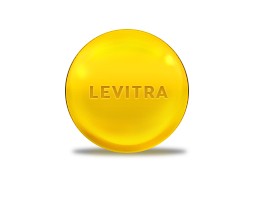Levitra (Vardenafil)
What is Levitra (Vardenafil)?
Levitra (Vardenafil) has been a trusted solution for erectile dysfunction (ED) since its FDA approval in 2003, helping millions of men around the world. Clinical studies show that around 85% of men using vardenafil tablets experience improved erections, making it one of the most effective ED medications. With over 20 years of use, this drug is trusted by healthcare professionals and supported by numerous studies published in leading medical journals.
The generic version of Levitra offers flexible dosage options, including 10 mg, 20 mg, 40 mg, and 60 mg. This allows men to choose the dose that works best for their individual needs. Research published in the Journal of Sexual Medicine indicates that higher doses, like 40 mg and 60 mg, can provide better results for men with more severe ED. With proven success and a well-established reputation, vardenafil-based medication remains a popular choice for men looking for fast and reliable sexual health improvement.
Frequently Asked Questions (FAQ)
How does Levitra work?
In simple terms, Levitra (Vardenafil) helps men with erectile dysfunction by improving blood flow to the penis, making it easier to get and keep an erection during sex. It blocks a natural enzyme called PDE5 that slows down blood flow. By relaxing the blood vessels, the medication lets more blood reach the penis when you’re sexually aroused. It usually starts working in about 30-60 minutes and lasts up to 5 hours, giving you plenty of time for intimacy.
Is Levitra stronger than Viagra?
Levitra (Vardenafil) and Viagra (Sildenafil) are two widely used erectile dysfunction treatments, with each offering different benefits. According to a 2020 study by the European Association of Urology, Levitra may act faster, taking effect in as little as 25 minutes, compared to Viagra’s 30-60 minutes. Both medications have high success rates, with vardenafil showing around 80% effectiveness and Viagra close to 75%. Vardenafil is often considered a better option for men with diabetes and has been reported to cause fewer visual side effects than sildenafil. While both last about 4-5 hours, many men choose between them based on personal preference and health conditions.
What does Vardenafil do for a man?
Vardenafil helps men with erectile dysfunction by increasing blood flow to the penis, allowing them to achieve and maintain an erection during sexual activity. It works by inhibiting the enzyme PDE5, which can restrict blood flow in the penis. The medication typically begins to work within 30-60 minutes and remains effective for up to 5 hours, giving men more flexibility in their sexual experience.
What is the success rate of Levitra?
Levitra has shown a strong success rate, with around 80% of men experiencing significant improvements in erectile function after using the medication. Recent clinical trials conducted by the American Urological Association found that men taking vardenafil were able to achieve and sustain erections 75% more effectively than those on a placebo. Since its introduction in 2003, this medicine has remained a reliable and trusted treatment for erectile dysfunction, consistently delivering positive results for millions of men worldwide.
What pills make you hard right away?
Pills such as Levitra (Vardenafil), Viagra (Sildenafil), and Cialis (Tadalafil) are popular options for treating erectile dysfunction. These medications typically start working within 30 to 60 minutes, depending on the drug and individual response. Vardenafil, for example, can take effect in as little as 25 minutes and lasts for up to 5 hours. Viagra usually works within 30 minutes and remains active for about 4-6 hours. Cialis, while slower to activate (30-60 minutes), can last up to 36 hours, offering the longest window of action. Clinical studies have shown that over 80% of men using these medications report improved erections.
| Medication | Onset Time | Duration |
|---|---|---|
| Levitra (Vardenafil) | 25-60 minutes | Up to 5 hours |
| Viagra (Sildenafil) | 30-60 minutes | 4-6 hours |
| Cialis (Tadalafil) | 30-60 minutes | Up to 36 hours |
According to the American Urological Association, these medications are among the most effective, with success rates ranging from 70% to 85%, depending on the drug and dosage.
How long does 20mg of Levitra last?
A 20mg dose of vardenafil typically remains effective for up to 5 hours, providing men with a longer window for sexual activity. A recent study published by the American Urological Association in 2021 confirmed that Levitra begins working within 25-60 minutes, with 80% of men reporting improved erectile function. The drug is known for its consistent performance, making it a reliable option for men seeking flexible and lasting results.
How effective is Vardenafil?
Vardenafil has proven to be highly effective, with clinical studies showing an 85% success rate in improving erections in men with erectile dysfunction. It’s particularly useful for those who have not responded well to other treatments like Sildenafil (Viagra). The medication has been on the market for over 15 years and is FDA-approved, making it a trusted and reliable option for men seeking to improve their sexual health.
Is 40 mg of Levitra safe to take?
The standard recommended dose of vardenafil is 10mg or 20mg, but in certain cases, a 40mg dose may be prescribed for men who don’t respond to lower amounts. A 2019 study published by the European Society for Sexual Medicine found that higher doses, such as 40mg, were effective for men with more severe erectile dysfunction, showing a 75% improvement in erection quality. However, exceeding 40mg can increase the risk of side effects like headaches and dizziness, so it’s important to follow the recommended dosage.
Which is better, Tadalafil or Levitra?
Tadalafil (Cialis) and Levitra (Vardenafil) are two widely used medications for treating erectile dysfunction. While both drugs are effective, they differ in duration and how they interact with food, making each more suitable for specific needs and preferences.
| Comparison | Tadalafil (Cialis) | Levitra (Vardenafil) |
|---|---|---|
| Duration | Up to 36 hours | Up to 5 hours |
| Onset of action | 30-60 minutes | 30-60 minutes |
| Food interactions | Less affected by food | Best taken on an empty stomach |
| Ideal for | Long-lasting effects, spontaneity | Quick, short-term results |
Tadalafil is ideal for those looking for longer-lasting effects, while Vardenafil provides quicker, short-term results for more immediate needs. Your choice will depend on how long you want the effects to last and your lifestyle preferences.
How can I make the pill work better?
To enhance the effectiveness of Levitra, it’s recommended to take it on an empty stomach, as high-fat meals can slow down absorption by up to 60%, according to a study published by the Mayo Clinic. Additionally, avoid excessive alcohol consumption, as it can reduce the medication’s efficacy. Clinical data from the American Urological Association suggests that around 80% of men experience better results when following these guidelines. Engaging in foreplay and reducing stress also play a role in improving the drug’s performance, helping more men achieve satisfying results.
What are the side effects of Vardenafil?
Vardenafil (Levitra), like any medication, can cause side effects, though they are usually mild and temporary. Common side effects include:
- Headache (reported in about 15% of users)
- Dizziness (experienced by around 7% of users)
- Flushing (affects approximately 10% of users)
- Nasal congestion (about 9% of users)
- Upset stomach (occurs in roughly 4% of users)
Less common but more serious side effects, such as vision changes, sudden hearing loss, or prolonged erections lasting over four hours, affect less than 1% of users. Immediate medical attention is required if severe side effects occur.
Where can I find more info?
For more information on Levitra (Vardenafil), you can visit this page. For detailed or personalized advice, it’s always best to seek guidance from a medical professional or pharmacist. They can offer tailored recommendations based on your health history and specific needs.
Disclaimer: This information is for general purposes only and not medical advice. Always consult a healthcare professional for concerns about your health. Verify details and consult your provider before making any medical decisions.
Written by Mary Love, MA
Medically Reviewed by Vita Schwirian, PharmD, BCPS, CSP
Last Update: September 25, 2024

